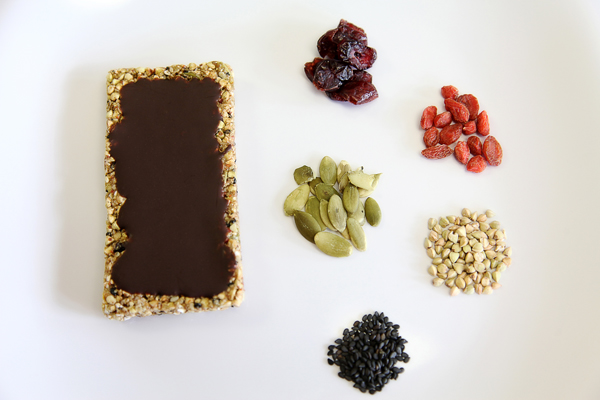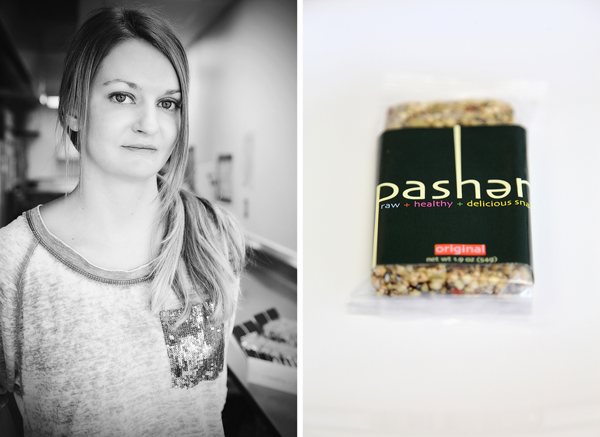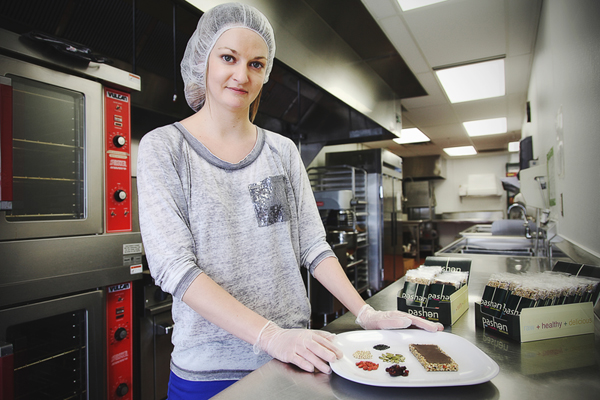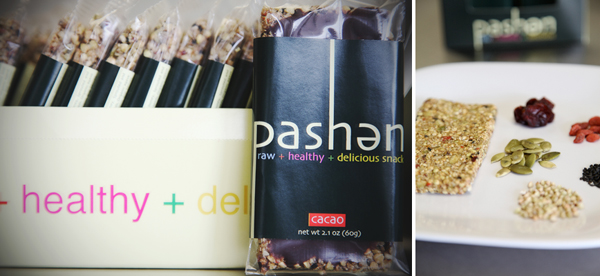
The on-the-go snackbar category of foods is so crowded that contemplating options can feel like being hit by a wall of sound — every choice touts its natural ingredients, and it can be wearying to tweeze out those with the lowest sugar and fewest chemicals.
Into this mix comes a local contender hoping to rise above the noise. Pashen bars, developed by a trio of siblings, are distinctive for using raw foods for their nutrient content. Ingredients include buckwheat, pumpkin seeds, goji berries, honey, almond butter, cacao, and sesame seeds. Everything is organic, and there’s as much local sourcing as possible, says co-founder Wendy Sorquist.

“As far as we know, we can’t get cacao and goji berries locally, but we can get quite a bit from farmers around here, including honey and even pepitas,” she says. “We’re looking to strategically align with suppliers; we want to work with people who share our vision.”
The small food company got its start when oldest sister Lisa Wilson, a health and wellness counselor in Washington D.C., developed a bar recipe while teaching classes about the benefits of raw food. Continually on the lookout for snack bars that didn’t contain “loads of junk,” as Sorquist says, Wilson drew on her experience as a nutritionist and her life as a raw food enthusiast to fashion a bar that her kids would eat.
When the bars became a huge hit with her clients, Wilson brought in her brother and sister in Minneapolis to make it a family business. They rented space and took food entrepreneur classes at Kindred Kitchen, the business incubator space in North Minneapolis. After wrangling with numerous options for a name, they settled on the phonetic spelling of “passion,” as a nod toward their enthusiasm about the business venture.
“We’re all in the same mindset when it comes to food and nutrition,” says co-founder Pol Sorquist. “And, we’ve all worked together all of our lives, so we know how to do that.” Their father owned a grocery store when the kids were growing up, so the trio spent many hours working behind the counter or stocking shelves. Amazingly, this led to greater family bonding rather than animosity, and the three seem genuinely thrilled to be able to get this venture off the ground together.
“We really enjoy spending time with each other,” says Pol. “It’s fun to be connected every day. Really, one of the greatest things about working with family members is that you can always be honest and trust them. When I have an idea, I don’t feel like I have to tiptoe around and hope they’ll like it. They’ll tell me if they don’t.”
It may sound a bit schmaltzy, or even like a fable — siblings who actually work really well together? — but Terese Hill, program manager at Kindred Kitchen, insists that the working relationship is as convivial as it sounds. Wendy and Pol work side by side, for hours, wrapping each bar by hand after mixing the ingredients in the Kindred Kitchen space. “I love the brother / sister story of it,” says Hill. “And they have great marketing and branding materials, too.”

Their story certainly attracted Linden Hills Co-op, which was one of the first to stock the bars. Marketing and Member Services Manager Allie Mentzer says the grocery appreciated that the bars were made in Minneapolis by a small family business. She says, “Over the years, we’ve served as an incubator of sorts for many small businesses just starting out, helping them introduce their products to folks who are predisposed to buy local.”
That means Pashen is generating all the buzzwords for an ideal co-op purveyor: local, organic, slow food, artisan, small batch, and responsibly sourced. When you throw in the “comes from a happy family” factor, Pashen pushes ahead of many competitors, especially from the huge snack bar producers like Clif Bar.

Pashen’s bars may find more shelf space thanks to their flavors alone. The bars are diminutive, but seem packed with ingredients, and possess a nutty undertone that’s delicious. In terms of texture, they’re surprisingly moist and chewy, and the chocolate of the cacao version isn’t the type of overly sweet layer that you find on some bars (I’m looking at you, Luna), but a well-balanced sweetness that deepens the other flavors.
There’s also the raw food factor. As Linden Hills Co-op Grocery Manager Tom Eckstein notes, raw foods are hot right now. These type of foods aren’t heated past 118 degrees, and include nuts, seeds, sprouted grains, fruits, and vegetables; raw foodists eschew animal products and heat-processed grains. The belief behind incorporating more raw food into the diet is that cooking can destroy enzymes that aid in digestion and detoxification.
Although there don’t seem to be any hard numbers on the surge in raw food product purchasing, Eckstein has observed a spike in interest locally. The movement also has some staying power — first proposed in the 1970s, raw foodism has stuck around since then, fueling the continuance of restaurants like Minneapolis-based Ecopolitan.
Eventually, the Pashen creators say they want to expand on their raw food business by easing their way into other competitive areas of the co-ops, doing products like trail mixes, or just expanding the line of flavors for their bars. Currently, they’re in seven locations, including Seward Co-op, Golden Fig Fine Foods, Peoples Organic Cafe, and French Meadow Bakery & Cafe.

These are so delicious. I just discovered them in my skyway lobby shop. You feel healthier just biting into one!